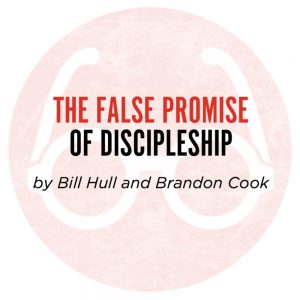Discipleship
By Dallas Willard
Article taken from Dwillard.com
How one thinks of discipleship within evangelicalism depends upon how one draws the line around that movement. If one draws the line, as is now common, to include only the “evangelicalism” that emerged from the conservative-to-fundamentalist churches of North America after World War II, then there is very little to say about discipleship there except what is anecdotal—and there is not a lot of that. There has simply been no consistent general teaching or practice under the heading of discipleship among evangelicals of this period: none that would be recognizable as discipleship in terms of biblical teaching or of the Christian past.
In the post WW II period the strongest association of evangelicalism was with evangelism, and for many citizens of North America the only thing they knew of evangelicals was that they are evangelistic. And indeed they were. They were intent upon proclaiming a gospel of “salvation” and upon winning converts to Christ. The most visible evangelical of the period was the world-renowned evangelist, Billy Graham. And the sub-group of evangelicals most associated with programs of discipleship, the Navigators, was focused upon winning converts—converts who were explicitly recognized by them as not being disciples until an optional further stage in commitment. Being a disciple was, for them, to be in training to become a soul winner, and discipleship was the process of training you underwent (under the direction of “workers,” people of a third stage of commitment and development) to enable you to win converts.1 The slogan of the Navigators was “To know Christ and to make Him known.” Their aim, as they said, was “to produce reproducers.”
This vision was firmly tied to the version of the Gospel and of salvation that dominated evangelicalism during the period. It was strictly a gospel of forgiveness of sins and assurance of heaven after death upon profession of faith in Jesus Christ—or, minimally, profession of faith in his having suffered the penalty for our sins upon the cross. If you believed in his death as your substitute, you were a Christian, even though you never became a disciple. Many of the Navigators were certainly among the finest followers of Christ from any period of Christian history. Their founder, Dawson Trotman, was an ardent disciple of Jesus by any sane standard and one of the greatest of 20th-century Christ followers.2 But as disciples, Navigators were far better than their theology and their program. They have blessed and continue to bless the earth with their lives and testimonies. Nevertheless, in them the essential disconnection between post WW II evangelicalism and discipleship prevailed and still prevails today.
Relying On Correct Beliefs Alone
During the mid- to late 20th Century, evangelicalism came to define itself in terms of the profession of correct belief alone. Holding correct doctrine was standardly presented as the condition of forgiveness of sins. Obsessed with threats from modernism and liberal theology, on the one hand, and from the looming presence of an allegedly “scientific” world view on the other, evangelicalism undertook to “contend earnestly for the faith which was once for all delivered to the saints.” (Jude verse 3) This meant to defend the truth of doctrines taken to be essential to a “saving” faith in Christ. Ironically, this phase of evangelicalism developed—as a social form—into a particular version of “nominal Christianity.” It had traditionally defined itself in opposition to nominal Christianity, emphasizing as it did an individualized “birth from above” and an ongoing personal experience of God. But its actual “nominal” status is the reality back of the statistics often quoted at the beginning of the 21st Century, that show little or no behavioral difference between the lives of contemporary evangelicals on the whole and the lives of those outside its circles. Being a Christian in evangelical terms came to be a matter of professing belief in time-honored tenets of traditional Christianity, with a few additional points about the nature and authority of the Bible and about eschatology.3
Called To a Closer Walk
But that left a deficiency which came to be deeply felt—especially among evangelicals most seriously devoted to Christ. This felt need for experience of God, for a life in God, expressed itself in various ways—ways always in some tension with the prevailing theology and with the most prominent evangelical leaders and teachers of the time. This tension has been an enduring problem within modern evangelicalism. It has expressed itself in various ways: for example, through interest in what was viewed as “higher life” or “deeper life” teachings. The “Keswick Movement” (associated with the Keswick Convention, running from 1875 to the present4) was centered on these teachings, and interest in them was cultivated by such authors as Andrew Murray (1828-1917) and F. B. Meyer (1847-1929). A slightly older work by Hannah Whitall Smith, The Christian’s Secret of a Happy Life (1875), was very influential in this vein, along with numerous similar writings, and more contemporary works such as Rosalind Rinker’s book, Prayer: Conversing with God (1959), which presented prayer as a lively conversation with God. These and similar works revitalized the “devotional life” of many evangelicals, often taken by them to be “discipleship” itself. Still older Catholic writers such as Thomas á Kempis (The Imitation of Christ) and Brother Lawrence (The Practice of the Presence of God) stoked the hidden fires of evangelical devotion—simultaneously confirming the grim suspicions of many leaders and teachers that the “deeper life” seekers and teachers were not properly evangelical. They were not satisfied with just believing the essentials or with “the pure milk of the word.”
The “Charismatic Movement”—breaking out in the early 20th Century in its “Holiness” form, and reviving in the post WW II period without the emphasis on holiness—was yet another challenge to the adequacy of this most recent “official” form of evangelical Christianity. Many evangelical leaders simply rejected the charismatic experience, and taught (some still teach) that charismatics are misled and dangerous to the faith. This was largely for fear that their “experiences” were not biblical and would undermine the authority of the Bible. But the hunger for and reality of an interactive life with God (the Holy Spirit) was not to be denied to people generally, and today the most effectual carriers of “evangelical truths” to the world are in fact charismatics. However, the focus upon spiritual gifts that characterizes the charismatic groups and teachers still does not include a realistic and theologically coherent teaching and practice of discipleship. It is still true of them that to be a Christian—even a “Spirit-filled” Christian—does not require that you be a disciple of Jesus Christ, or that you, through the course of discipleship, take on the character of Jesus Christ in your life as a whole.
The widely felt inadequacy of the official 20th-century evangelical teachings to life (however effectual for death and judgment) also expressed itself by the emergence of “Christian Psychology” among evangelicals in the 1960s. This movement was a tacit acknowledgement that teaching the truth, and eliciting profession of the central doctrines, did not solve the problems of Christian living. As a result it was strongly resisted across a broad range of evangelical life. By the 21st century, however, it had burgeoned into a vast profession, with extensive training and higher academic degrees available from the most prominent of evangelical educational institutions. It clearly intersects in aims and some of its methods with what would have counted as discipleship or training in following Christ at other times and places. Many of the larger evangelical churches and groups now provide psychological counseling as a major part of their ministry.
Currently, Christian psychology is interacting with yet another significant tendency in evangelical life. The emergence of “spiritual formation” among evangelicals toward the end of the 20th century was also a response to the felt need of many for a spiritual life, in addition to correct beliefs and outward practices. This need was associated with the increasing failure of “denominational distinctives” to constitute a spiritual existence or a life for the individual. It is rare to find evangelicals within these churches who could make a life of being a Presbyterian, Baptist, Catholic, Lutheran, Pentecostal, etc. By contrast, “spiritual formation,” like discipleship itself during some periods of the past, was associated with learning to live a remarkably different kind of life: one of pervading spiritual reality and transformed character. In its quest, spiritual formation among evangelicals reached out to learn from the Church and from Christians across the ages, on the one hand, and it also turned the individual’s focus toward redemption of their life as a whole.5 “Spiritual formation” edged—however obscurely or unintentionally—toward thinking of salvation, the essence of Christian deliverance, in more comprehensive terms than the after-life alone. Once again, prominent evangelical spokespersons, were uneasy. But how one understands salvation turns out to be the key to what one makes of discipleship, as well as to any possible renewal of evangelicalism as a redemptive force for the future. Post WW II evangelicalism simply had no essential place for discipleship in its view of salvation.
Evangelicalism from Wesley to Finney
We must draw the line around evangelicalism beyond post WWII America if we are to see any close connection between its vital core and discipleship to Jesus Christ. It is sometimes said that evangelical Christianity began in the 18th Century, with people who were willing to preach out of doors at a time when that was a very radical step. The reference to “preaching out of doors” picks out the ministries of George Whitefield (1714-1770) and John Wesley (1703-1791), but also of many preachers who followed after them in the settlements and frontiers of America. Jonathan Edwards (1703-1758), though he did not regularly “preach out of doors,” is often regarded as historic evangelicalism’s most competent…(read more)


![Discipleship Resource of the Year: Conversion & Discipleship [Award]](https://staging.discipleship.org/wp-content/uploads/2017/04/b_conversion-300x300.jpg)

